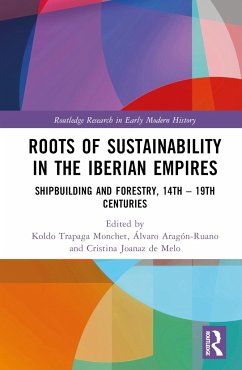Roots of Sustainability in the Iberian Empires
Shipbuilding and Forestry, 14th - 19th Centuries
Herausgeber: Trapaga Monchet, Koldo; Joanaz De Melo, Cristina; Aragón-Ruano, Álvaro
Roots of Sustainability in the Iberian Empires
Shipbuilding and Forestry, 14th - 19th Centuries
Herausgeber: Trapaga Monchet, Koldo; Joanaz De Melo, Cristina; Aragón-Ruano, Álvaro
- Gebundenes Buch
- Merkliste
- Auf die Merkliste
- Bewerten Bewerten
- Teilen
- Produkt teilen
- Produkterinnerung
- Produkterinnerung
This book aims to shed light on the roots of sustainability in the Iberian Peninsula that lie in the interrelations between shipbuilding and forestry from the 14th to the 19th centuries, combining various geographical scales (local, regional and national) and different timespans (short-term and long-term studies).
Andere Kunden interessierten sich auch für
![The Roots of Environmental Consciousness The Roots of Environmental Consciousness]() Stephen Hussey / Paul Thompson (eds.)The Roots of Environmental Consciousness61,99 €
Stephen Hussey / Paul Thompson (eds.)The Roots of Environmental Consciousness61,99 €![Australian Between Empires Australian Between Empires]() David LoweAustralian Between Empires216,99 €
David LoweAustralian Between Empires216,99 €![Empires and Boundaries Empires and Boundaries]() Harald Fischer-Tiné / Susanne Gehrmann (eds.)Empires and Boundaries216,99 €
Harald Fischer-Tiné / Susanne Gehrmann (eds.)Empires and Boundaries216,99 €![An Uncensored Diary From the Central Empires An Uncensored Diary From the Central Empires]() Ernesta Drinker BullittAn Uncensored Diary From the Central Empires37,99 €
Ernesta Drinker BullittAn Uncensored Diary From the Central Empires37,99 €![A History of the Nations and Empires Involved and a Study of the Events Culminating in the Great Conflict A History of the Nations and Empires Involved and a Study of the Events Culminating in the Great Conflict]() Logan MarshallA History of the Nations and Empires Involved and a Study of the Events Culminating in the Great Conflict24,90 €
Logan MarshallA History of the Nations and Empires Involved and a Study of the Events Culminating in the Great Conflict24,90 €![An History Of Muhammedanism: Comprising The Life And Character Of The Arabian Prophet, And Succinct Accounts Of The Empires Founded By The Muhammed An History Of Muhammedanism: Comprising The Life And Character Of The Arabian Prophet, And Succinct Accounts Of The Empires Founded By The Muhammed]() Charles MillsAn History Of Muhammedanism: Comprising The Life And Character Of The Arabian Prophet, And Succinct Accounts Of The Empires Founded By The Muhammed44,99 €
Charles MillsAn History Of Muhammedanism: Comprising The Life And Character Of The Arabian Prophet, And Succinct Accounts Of The Empires Founded By The Muhammed44,99 €![The Roots of the War: A Non-technical History of Europe, 1870-1914, A.D The Roots of the War: A Non-technical History of Europe, 1870-1914, A.D]() William Stearns DavisThe Roots of the War: A Non-technical History of Europe, 1870-1914, A.D46,99 €
William Stearns DavisThe Roots of the War: A Non-technical History of Europe, 1870-1914, A.D46,99 €-
-
-
This book aims to shed light on the roots of sustainability in the Iberian Peninsula that lie in the interrelations between shipbuilding and forestry from the 14th to the 19th centuries, combining various geographical scales (local, regional and national) and different timespans (short-term and long-term studies).
Hinweis: Dieser Artikel kann nur an eine deutsche Lieferadresse ausgeliefert werden.
Hinweis: Dieser Artikel kann nur an eine deutsche Lieferadresse ausgeliefert werden.
Produktdetails
- Produktdetails
- Verlag: Routledge
- Seitenzahl: 300
- Erscheinungstermin: 5. Juni 2023
- Englisch
- Abmessung: 240mm x 161mm x 21mm
- Gewicht: 617g
- ISBN-13: 9781032313375
- ISBN-10: 1032313374
- Artikelnr.: 67514339
- Herstellerkennzeichnung
- Libri GmbH
- Europaallee 1
- 36244 Bad Hersfeld
- gpsr@libri.de
- Verlag: Routledge
- Seitenzahl: 300
- Erscheinungstermin: 5. Juni 2023
- Englisch
- Abmessung: 240mm x 161mm x 21mm
- Gewicht: 617g
- ISBN-13: 9781032313375
- ISBN-10: 1032313374
- Artikelnr.: 67514339
- Herstellerkennzeichnung
- Libri GmbH
- Europaallee 1
- 36244 Bad Hersfeld
- gpsr@libri.de
Koldo Trapaga Monchet is currently an Associate Professor of Early Modern History at King Juan Carlos University. His two main research lines revolve around the politics and governance of the royal forests and woodlands in the Iberian Peninsula from the 15th to the 17th centuries, especially in regard to shipbuilding, and the study of the political performance and the royal households of Don Juan José de Austria in the Hispanic Monarchy. Alvaro Aragón Ruano took his degree in History at the University of Deusto (1992) and later moved to the University of the Basque Country, where he is currently acting as Aggregate Professor, obtaining his PhD by means of research into woodland in Guipúzcoa during the Early Modern era. Since then, he has spent over 20 years analyzing different aspects of Basque forest history. Nowadays he is focused on Basque-Navarrese woodlands' historical management and sustainability during the Medieval and Early Modern eras. Cristina Joanaz de Melo is Integrated Researcher at Universidade NOVA de Lisboa (IHC-Lab:in2past) and Invited Professor at Universidade Autónoma de Lisboa, teaching a course on "Environmental History". She is founding member of the Portuguese Network of Environmental History (REPORTHA 2015). Her PhD, on Hydrological and Forestry Policies in Portugal (and Southern Europe), 1830s to 1880s, was taken at the European University Institute (Florence, 2010). Working and publishing on natural resources, hunting and forests since the 1990s, her current interests lie in natural resource recovery, renewal and compensation due to human agency, from the 1400s to the 1800s, across the Iberian Peninsula and naval empires.
1. The global timber trade and shipbuilding in the 16th-18th centuries:
interdisciplinarity, research problems and the ForSEAdiscovery project / 2.
Durable Forests in a Tensile State: Intensive and Extensive Approaches to
Naval Forestry in Early Modern Spain / 3. Empirical silviculture and
sustainability in the Basque Country during the Early Modern Period / 4.
The sustainability of forests for shipbuilding. A historical-archaeological
view of Biscayan shipbuilding and its forestry tradition in the 16th-17th
centuries / 5. The beginnings of the preservation and development of
Spanish forestry for naval construction: the legal and silvicultural
enquiries conducted by the Royal Council of Castile in Guipúzcoa (1569) /
6. "In All this Kingdom there Is No Timber". Wood for the king's galleys:
exploitation and conservation of the Catalan forests in the age of Lepanto
/ 7. A destruction that preserves: maritime warfare, empirical forestry and
sustainability in Portugal (13-17th centuries) / 8. Sustainability
assessment of forest resources in the geographical area of application of
the 1546 Cork Oak Law / 9. Logistics, sustainability and river transport of
wood supplies from the Navarrese Pyrenees for the Royal Navy at the end of
the 18th century / 10. Forests in Portugal, 1750s-1820s: A History of
Forests Compensation
interdisciplinarity, research problems and the ForSEAdiscovery project / 2.
Durable Forests in a Tensile State: Intensive and Extensive Approaches to
Naval Forestry in Early Modern Spain / 3. Empirical silviculture and
sustainability in the Basque Country during the Early Modern Period / 4.
The sustainability of forests for shipbuilding. A historical-archaeological
view of Biscayan shipbuilding and its forestry tradition in the 16th-17th
centuries / 5. The beginnings of the preservation and development of
Spanish forestry for naval construction: the legal and silvicultural
enquiries conducted by the Royal Council of Castile in Guipúzcoa (1569) /
6. "In All this Kingdom there Is No Timber". Wood for the king's galleys:
exploitation and conservation of the Catalan forests in the age of Lepanto
/ 7. A destruction that preserves: maritime warfare, empirical forestry and
sustainability in Portugal (13-17th centuries) / 8. Sustainability
assessment of forest resources in the geographical area of application of
the 1546 Cork Oak Law / 9. Logistics, sustainability and river transport of
wood supplies from the Navarrese Pyrenees for the Royal Navy at the end of
the 18th century / 10. Forests in Portugal, 1750s-1820s: A History of
Forests Compensation
1. The global timber trade and shipbuilding in the 16th-18th centuries:
interdisciplinarity, research problems and the ForSEAdiscovery project / 2.
Durable Forests in a Tensile State: Intensive and Extensive Approaches to
Naval Forestry in Early Modern Spain / 3. Empirical silviculture and
sustainability in the Basque Country during the Early Modern Period / 4.
The sustainability of forests for shipbuilding. A historical-archaeological
view of Biscayan shipbuilding and its forestry tradition in the 16th-17th
centuries / 5. The beginnings of the preservation and development of
Spanish forestry for naval construction: the legal and silvicultural
enquiries conducted by the Royal Council of Castile in Guipúzcoa (1569) /
6. "In All this Kingdom there Is No Timber". Wood for the king's galleys:
exploitation and conservation of the Catalan forests in the age of Lepanto
/ 7. A destruction that preserves: maritime warfare, empirical forestry and
sustainability in Portugal (13-17th centuries) / 8. Sustainability
assessment of forest resources in the geographical area of application of
the 1546 Cork Oak Law / 9. Logistics, sustainability and river transport of
wood supplies from the Navarrese Pyrenees for the Royal Navy at the end of
the 18th century / 10. Forests in Portugal, 1750s-1820s: A History of
Forests Compensation
interdisciplinarity, research problems and the ForSEAdiscovery project / 2.
Durable Forests in a Tensile State: Intensive and Extensive Approaches to
Naval Forestry in Early Modern Spain / 3. Empirical silviculture and
sustainability in the Basque Country during the Early Modern Period / 4.
The sustainability of forests for shipbuilding. A historical-archaeological
view of Biscayan shipbuilding and its forestry tradition in the 16th-17th
centuries / 5. The beginnings of the preservation and development of
Spanish forestry for naval construction: the legal and silvicultural
enquiries conducted by the Royal Council of Castile in Guipúzcoa (1569) /
6. "In All this Kingdom there Is No Timber". Wood for the king's galleys:
exploitation and conservation of the Catalan forests in the age of Lepanto
/ 7. A destruction that preserves: maritime warfare, empirical forestry and
sustainability in Portugal (13-17th centuries) / 8. Sustainability
assessment of forest resources in the geographical area of application of
the 1546 Cork Oak Law / 9. Logistics, sustainability and river transport of
wood supplies from the Navarrese Pyrenees for the Royal Navy at the end of
the 18th century / 10. Forests in Portugal, 1750s-1820s: A History of
Forests Compensation








